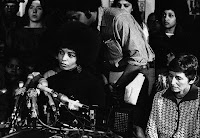 |
| Still from Free Angela and All Political Prisoners |
Probably the best is My German Friend, Jeanine Meerapfel's consideration of a woman's German-Jewish-Argentine identity over three decades. Combining a bit of history, soul-searching and some romance, it works on all levels. I had hoped to speak to the director, but just missed her.
Moving into the realms of black comedy, the Basque film Happy New Year, Grandma had me covering my eyes in horror, as a family seeking to remove its troublesome elder stateswoman unravelled in fine style. I found it difficult to get past the premise that adult children could be quite so selfish, and so laughs were hard to come by, but it's well-crafted. The lead male actor also starred in Ander.
Documentaries were a bit disappointing this year. Canned Dreams I found overly stylised and way too slow. Les Invisibles focused on individuals from the French LGBT community in a way that seemed about 20 years behind the times, although some of the interviewees were impressive.
The standout doc for me was Free Angela and All Political Prisoners, although the title is misleading. Really it's an explanation of Angela Davis's time underground and the ensuing court case that resulted in her release. Not so much is heard about other political prisoners. And in fact it's a bit of a hagiography. Once Davis is released, there follows a triumphant montage of her visiting lands far and wide to receive acclaim as a revolutionary saved from martyrdom. Not mentioned is the fate of her co-accused, whom she cut loose. legally speaking. Nor is there any explanation of how a gun registered in her name fell into the hands of the man who used it in the botched courtroom raid that led to her arrest. Perhaps director Shola Lynch was so in awe of her subject, she didn't press the awkward points. Still, it remains a fascinating tale well-told.
 |
| Still from Breaking the Frame |
My review of the comedy Celeste and Jesse Forever is up on The Quietus.
And to end with, I didn't see many shorts, but did catch two shorts programmes. Mati Diop, whose work I didn't know, has a programme showing (today, actually) of three shorts. I caught two, both very different in tone and content. Big in Vietnam features two Vietnamese expats wandering the streets of Marseille and experiencing some kind of connection far from home. I found it a bit abstract, but it does capture the dislocation one can feel when uprooted. And then there's Snow Canon. Well, this is a bit of a cryptic psychological narrative featuring a teenaged girl and a baby sitter spending the weekend in a chalet, with a bit of role-playing and sexual tension thrown in.
Lastly, I saw more family drama on show in Blood Is Thicker Than Water, which amassed a range of ideas of family and drama. A family of dogs roaming Cairo starred in the very impressive A Resident of the City, but human beings had their day, too. I was moved to tears by Curfew, in which a recovering drug addict tries to re-connect with his estranged sister via her daughter. And Get Lucky, featuring Ralf Little as the world's unluckiest man, raised a few laughs, too.
To end with, two moments I forgot to mention from the filmmaker tea. One, as I stood waiting to meet my interviewees, a door opened and an older man with piercing blue eyes crossed my path. "That looks like Terence Stamp", I thought, but nobody else blinked an eyelid, so I thought no more of it. But, now I see he does have a film at the festival, and so it probably was the very same actor.
And, lastly, as I consider it my civic duty to spread feminist notions of film far and wide, I am pleased to say that I introduced Kate Hardie to the Bechdel-Wallace test, and very pleased she was to make its acquaintance, too.
Best of the second week:
Free Angela and All Political Prisoners
My German Friend


















